Corporate Social Responsibility Research
VerifiedAdded on 2020/06/06
|9
|2393
|115
AI Summary
This assignment delves into the concept of Corporate Social Responsibility (CSR), examining its definition, benefits, challenges, and various dimensions. It requires students to conduct research using provided sources and analyze the relationship between CSR and factors such as financial performance, employee trust, and consumer perceptions. The assignment emphasizes a critical understanding of CSR's role in contemporary business practices.
Contribute Materials
Your contribution can guide someone’s learning journey. Share your
documents today.
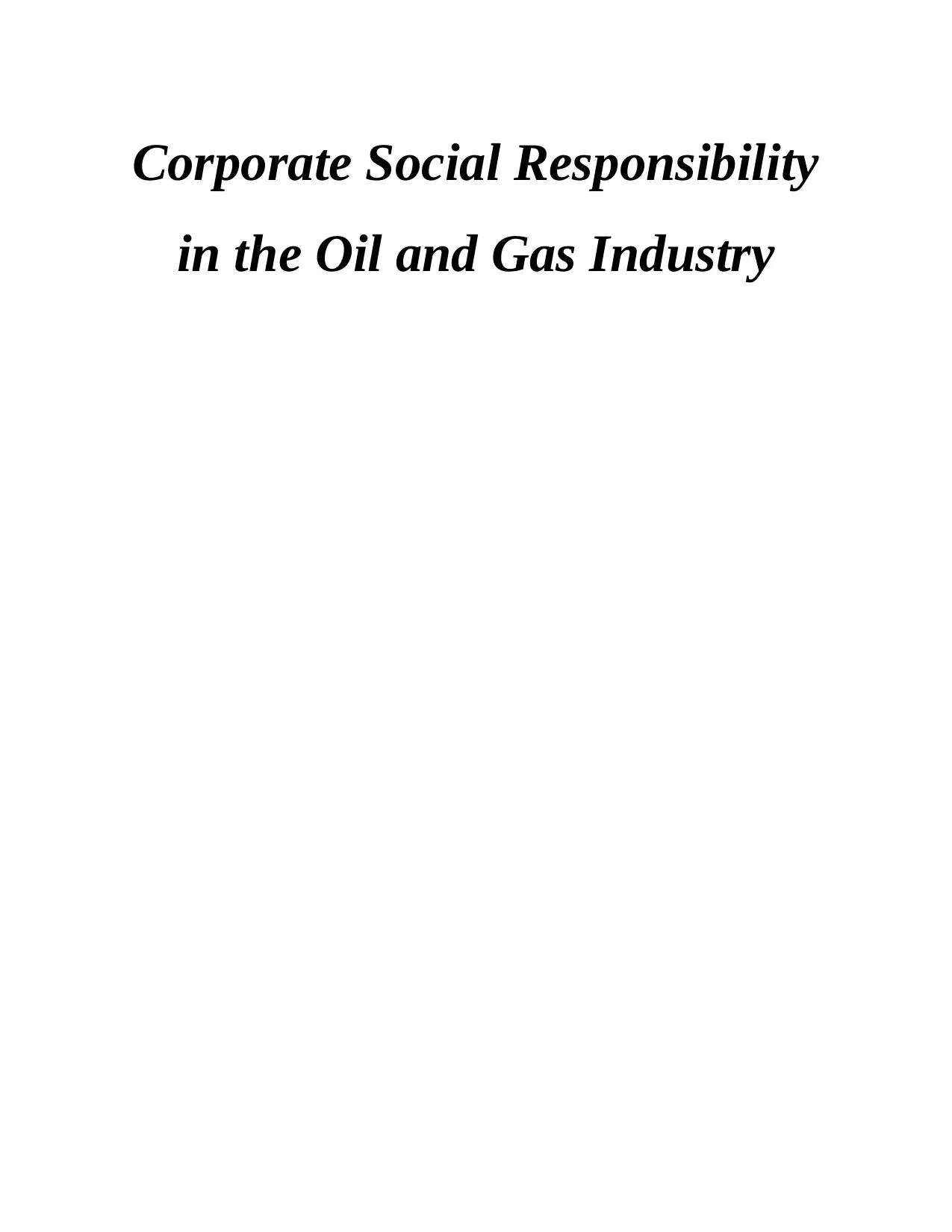
Corporate Social Responsibility
in the Oil and Gas Industry
in the Oil and Gas Industry
Secure Best Marks with AI Grader
Need help grading? Try our AI Grader for instant feedback on your assignments.
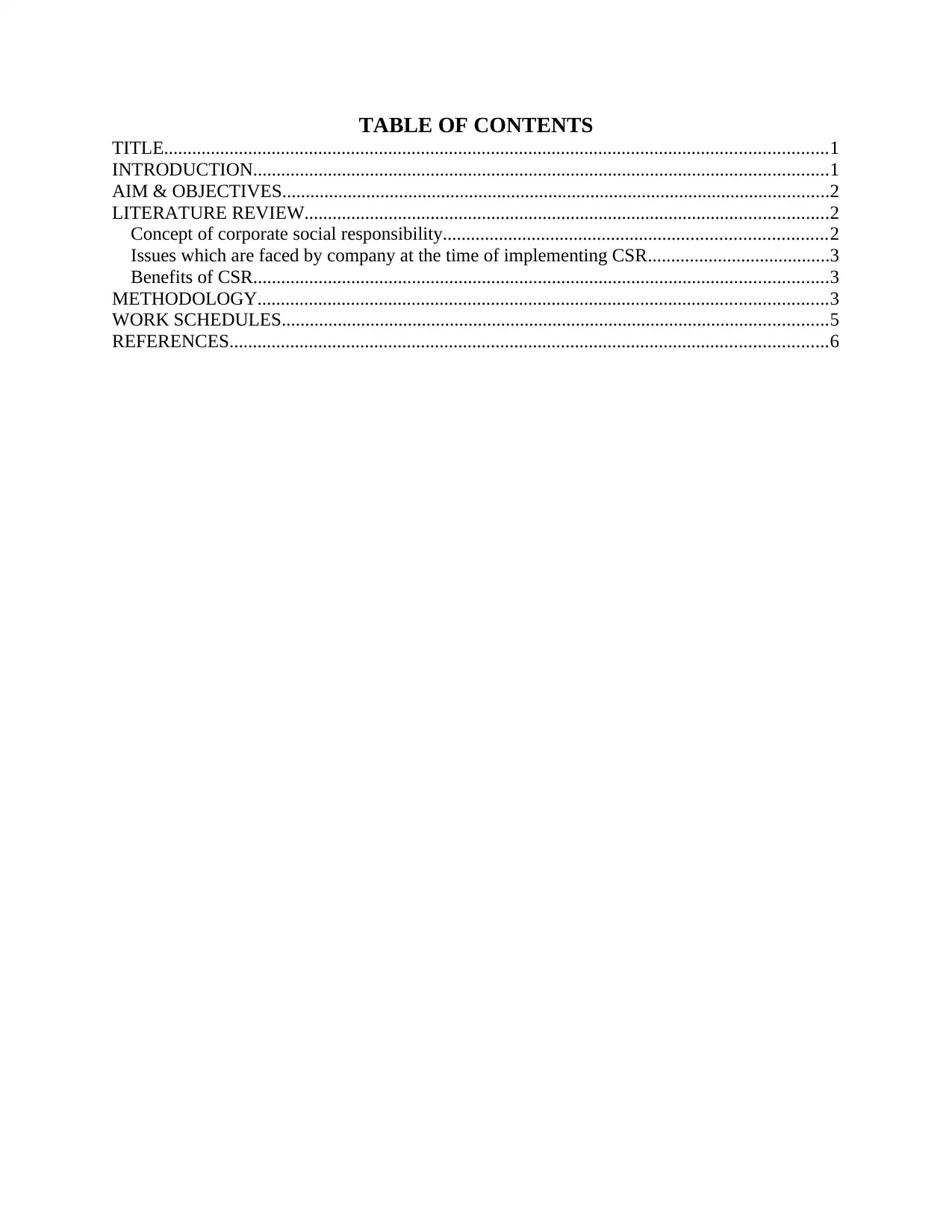
TABLE OF CONTENTS
TITLE..............................................................................................................................................1
INTRODUCTION...........................................................................................................................1
AIM & OBJECTIVES.....................................................................................................................2
LITERATURE REVIEW................................................................................................................2
Concept of corporate social responsibility..................................................................................2
Issues which are faced by company at the time of implementing CSR.......................................3
Benefits of CSR...........................................................................................................................3
METHODOLOGY..........................................................................................................................3
WORK SCHEDULES.....................................................................................................................5
REFERENCES................................................................................................................................6
TITLE..............................................................................................................................................1
INTRODUCTION...........................................................................................................................1
AIM & OBJECTIVES.....................................................................................................................2
LITERATURE REVIEW................................................................................................................2
Concept of corporate social responsibility..................................................................................2
Issues which are faced by company at the time of implementing CSR.......................................3
Benefits of CSR...........................................................................................................................3
METHODOLOGY..........................................................................................................................3
WORK SCHEDULES.....................................................................................................................5
REFERENCES................................................................................................................................6
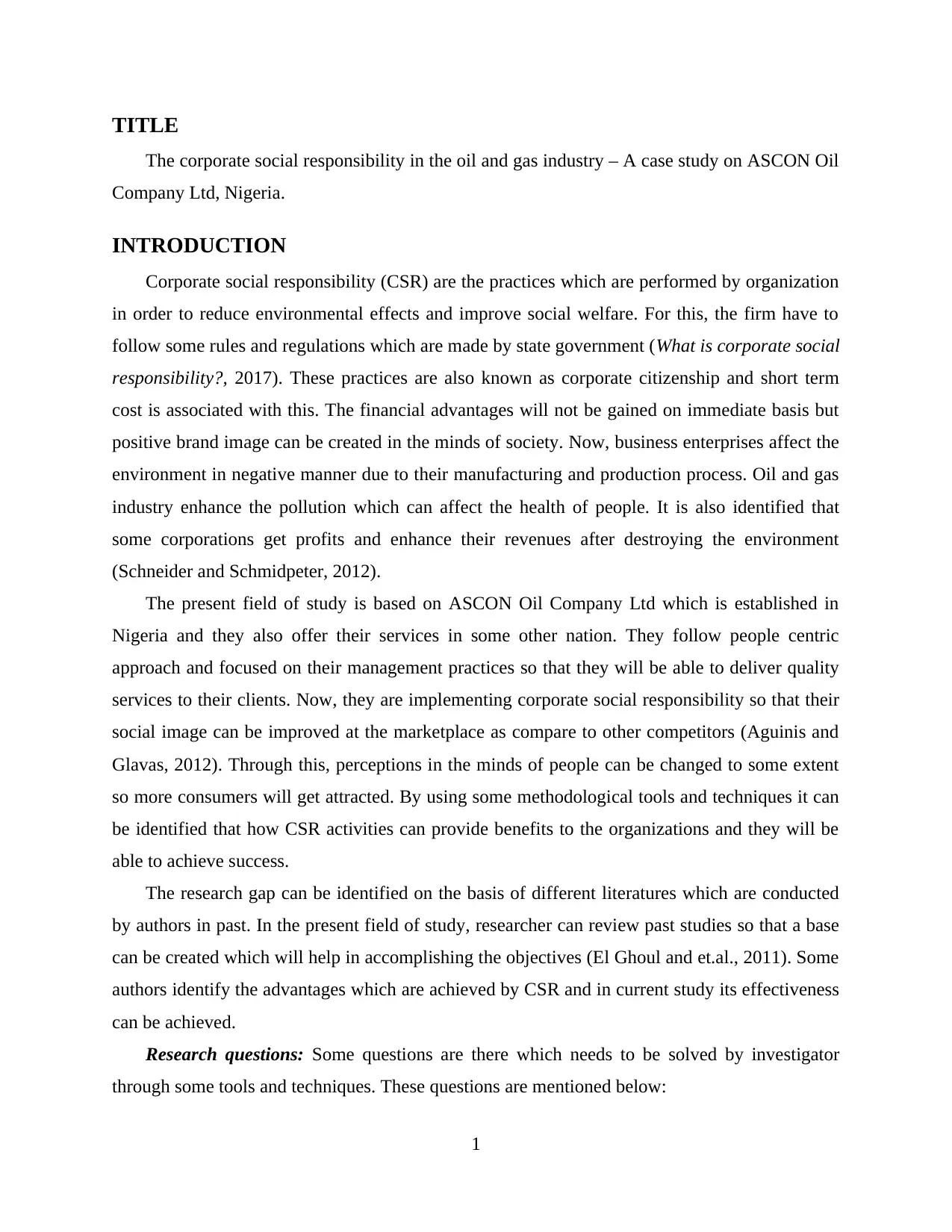
TITLE
The corporate social responsibility in the oil and gas industry – A case study on ASCON Oil
Company Ltd, Nigeria.
INTRODUCTION
Corporate social responsibility (CSR) are the practices which are performed by organization
in order to reduce environmental effects and improve social welfare. For this, the firm have to
follow some rules and regulations which are made by state government (What is corporate social
responsibility?, 2017). These practices are also known as corporate citizenship and short term
cost is associated with this. The financial advantages will not be gained on immediate basis but
positive brand image can be created in the minds of society. Now, business enterprises affect the
environment in negative manner due to their manufacturing and production process. Oil and gas
industry enhance the pollution which can affect the health of people. It is also identified that
some corporations get profits and enhance their revenues after destroying the environment
(Schneider and Schmidpeter, 2012).
The present field of study is based on ASCON Oil Company Ltd which is established in
Nigeria and they also offer their services in some other nation. They follow people centric
approach and focused on their management practices so that they will be able to deliver quality
services to their clients. Now, they are implementing corporate social responsibility so that their
social image can be improved at the marketplace as compare to other competitors (Aguinis and
Glavas, 2012). Through this, perceptions in the minds of people can be changed to some extent
so more consumers will get attracted. By using some methodological tools and techniques it can
be identified that how CSR activities can provide benefits to the organizations and they will be
able to achieve success.
The research gap can be identified on the basis of different literatures which are conducted
by authors in past. In the present field of study, researcher can review past studies so that a base
can be created which will help in accomplishing the objectives (El Ghoul and et.al., 2011). Some
authors identify the advantages which are achieved by CSR and in current study its effectiveness
can be achieved.
Research questions: Some questions are there which needs to be solved by investigator
through some tools and techniques. These questions are mentioned below:
1
The corporate social responsibility in the oil and gas industry – A case study on ASCON Oil
Company Ltd, Nigeria.
INTRODUCTION
Corporate social responsibility (CSR) are the practices which are performed by organization
in order to reduce environmental effects and improve social welfare. For this, the firm have to
follow some rules and regulations which are made by state government (What is corporate social
responsibility?, 2017). These practices are also known as corporate citizenship and short term
cost is associated with this. The financial advantages will not be gained on immediate basis but
positive brand image can be created in the minds of society. Now, business enterprises affect the
environment in negative manner due to their manufacturing and production process. Oil and gas
industry enhance the pollution which can affect the health of people. It is also identified that
some corporations get profits and enhance their revenues after destroying the environment
(Schneider and Schmidpeter, 2012).
The present field of study is based on ASCON Oil Company Ltd which is established in
Nigeria and they also offer their services in some other nation. They follow people centric
approach and focused on their management practices so that they will be able to deliver quality
services to their clients. Now, they are implementing corporate social responsibility so that their
social image can be improved at the marketplace as compare to other competitors (Aguinis and
Glavas, 2012). Through this, perceptions in the minds of people can be changed to some extent
so more consumers will get attracted. By using some methodological tools and techniques it can
be identified that how CSR activities can provide benefits to the organizations and they will be
able to achieve success.
The research gap can be identified on the basis of different literatures which are conducted
by authors in past. In the present field of study, researcher can review past studies so that a base
can be created which will help in accomplishing the objectives (El Ghoul and et.al., 2011). Some
authors identify the advantages which are achieved by CSR and in current study its effectiveness
can be achieved.
Research questions: Some questions are there which needs to be solved by investigator
through some tools and techniques. These questions are mentioned below:
1
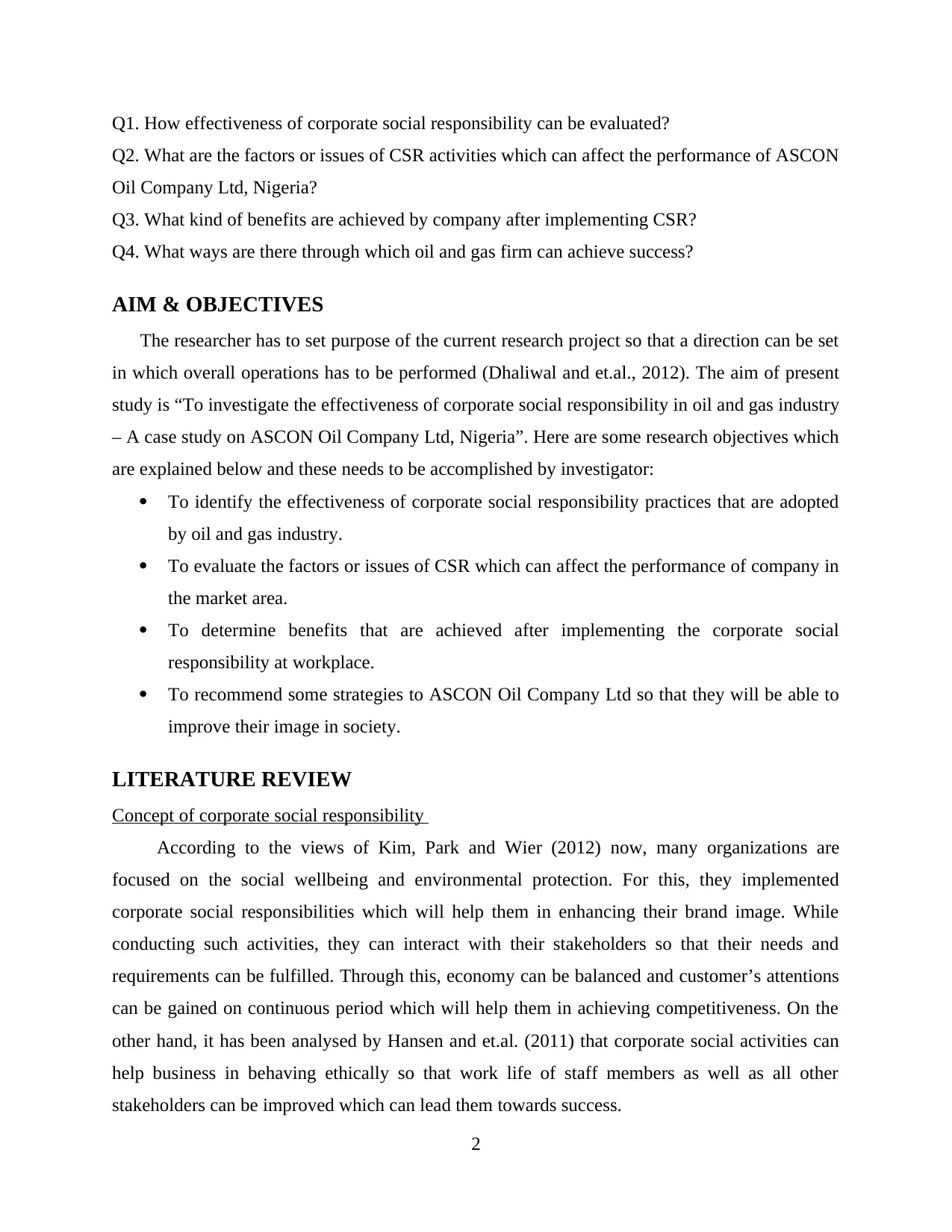
Q1. How effectiveness of corporate social responsibility can be evaluated?
Q2. What are the factors or issues of CSR activities which can affect the performance of ASCON
Oil Company Ltd, Nigeria?
Q3. What kind of benefits are achieved by company after implementing CSR?
Q4. What ways are there through which oil and gas firm can achieve success?
AIM & OBJECTIVES
The researcher has to set purpose of the current research project so that a direction can be set
in which overall operations has to be performed (Dhaliwal and et.al., 2012). The aim of present
study is “To investigate the effectiveness of corporate social responsibility in oil and gas industry
– A case study on ASCON Oil Company Ltd, Nigeria”. Here are some research objectives which
are explained below and these needs to be accomplished by investigator:
To identify the effectiveness of corporate social responsibility practices that are adopted
by oil and gas industry.
To evaluate the factors or issues of CSR which can affect the performance of company in
the market area.
To determine benefits that are achieved after implementing the corporate social
responsibility at workplace.
To recommend some strategies to ASCON Oil Company Ltd so that they will be able to
improve their image in society.
LITERATURE REVIEW
Concept of corporate social responsibility
According to the views of Kim, Park and Wier (2012) now, many organizations are
focused on the social wellbeing and environmental protection. For this, they implemented
corporate social responsibilities which will help them in enhancing their brand image. While
conducting such activities, they can interact with their stakeholders so that their needs and
requirements can be fulfilled. Through this, economy can be balanced and customer’s attentions
can be gained on continuous period which will help them in achieving competitiveness. On the
other hand, it has been analysed by Hansen and et.al. (2011) that corporate social activities can
help business in behaving ethically so that work life of staff members as well as all other
stakeholders can be improved which can lead them towards success.
2
Q2. What are the factors or issues of CSR activities which can affect the performance of ASCON
Oil Company Ltd, Nigeria?
Q3. What kind of benefits are achieved by company after implementing CSR?
Q4. What ways are there through which oil and gas firm can achieve success?
AIM & OBJECTIVES
The researcher has to set purpose of the current research project so that a direction can be set
in which overall operations has to be performed (Dhaliwal and et.al., 2012). The aim of present
study is “To investigate the effectiveness of corporate social responsibility in oil and gas industry
– A case study on ASCON Oil Company Ltd, Nigeria”. Here are some research objectives which
are explained below and these needs to be accomplished by investigator:
To identify the effectiveness of corporate social responsibility practices that are adopted
by oil and gas industry.
To evaluate the factors or issues of CSR which can affect the performance of company in
the market area.
To determine benefits that are achieved after implementing the corporate social
responsibility at workplace.
To recommend some strategies to ASCON Oil Company Ltd so that they will be able to
improve their image in society.
LITERATURE REVIEW
Concept of corporate social responsibility
According to the views of Kim, Park and Wier (2012) now, many organizations are
focused on the social wellbeing and environmental protection. For this, they implemented
corporate social responsibilities which will help them in enhancing their brand image. While
conducting such activities, they can interact with their stakeholders so that their needs and
requirements can be fulfilled. Through this, economy can be balanced and customer’s attentions
can be gained on continuous period which will help them in achieving competitiveness. On the
other hand, it has been analysed by Hansen and et.al. (2011) that corporate social activities can
help business in behaving ethically so that work life of staff members as well as all other
stakeholders can be improved which can lead them towards success.
2
Secure Best Marks with AI Grader
Need help grading? Try our AI Grader for instant feedback on your assignments.
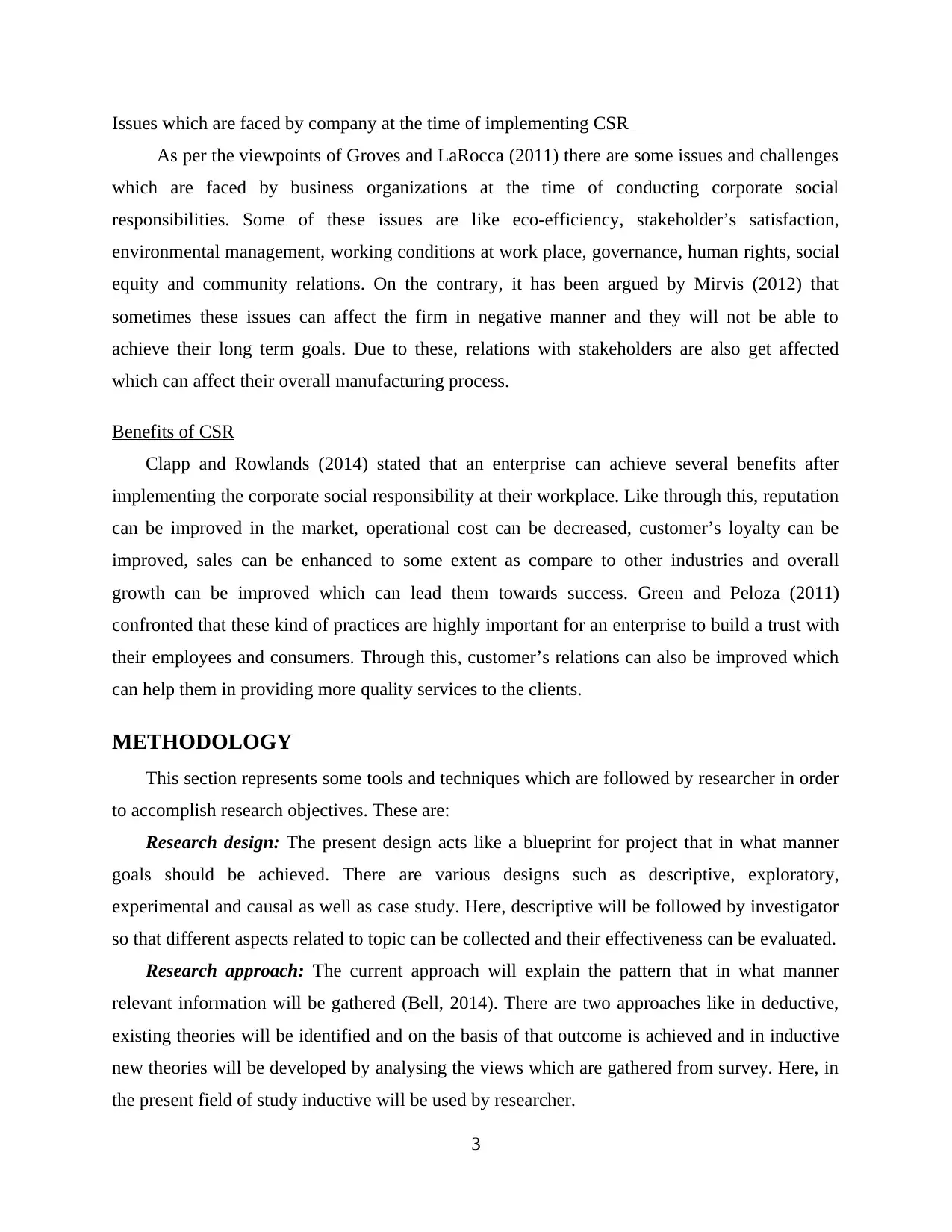
Issues which are faced by company at the time of implementing CSR
As per the viewpoints of Groves and LaRocca (2011) there are some issues and challenges
which are faced by business organizations at the time of conducting corporate social
responsibilities. Some of these issues are like eco-efficiency, stakeholder’s satisfaction,
environmental management, working conditions at work place, governance, human rights, social
equity and community relations. On the contrary, it has been argued by Mirvis (2012) that
sometimes these issues can affect the firm in negative manner and they will not be able to
achieve their long term goals. Due to these, relations with stakeholders are also get affected
which can affect their overall manufacturing process.
Benefits of CSR
Clapp and Rowlands (2014) stated that an enterprise can achieve several benefits after
implementing the corporate social responsibility at their workplace. Like through this, reputation
can be improved in the market, operational cost can be decreased, customer’s loyalty can be
improved, sales can be enhanced to some extent as compare to other industries and overall
growth can be improved which can lead them towards success. Green and Peloza (2011)
confronted that these kind of practices are highly important for an enterprise to build a trust with
their employees and consumers. Through this, customer’s relations can also be improved which
can help them in providing more quality services to the clients.
METHODOLOGY
This section represents some tools and techniques which are followed by researcher in order
to accomplish research objectives. These are:
Research design: The present design acts like a blueprint for project that in what manner
goals should be achieved. There are various designs such as descriptive, exploratory,
experimental and causal as well as case study. Here, descriptive will be followed by investigator
so that different aspects related to topic can be collected and their effectiveness can be evaluated.
Research approach: The current approach will explain the pattern that in what manner
relevant information will be gathered (Bell, 2014). There are two approaches like in deductive,
existing theories will be identified and on the basis of that outcome is achieved and in inductive
new theories will be developed by analysing the views which are gathered from survey. Here, in
the present field of study inductive will be used by researcher.
3
As per the viewpoints of Groves and LaRocca (2011) there are some issues and challenges
which are faced by business organizations at the time of conducting corporate social
responsibilities. Some of these issues are like eco-efficiency, stakeholder’s satisfaction,
environmental management, working conditions at work place, governance, human rights, social
equity and community relations. On the contrary, it has been argued by Mirvis (2012) that
sometimes these issues can affect the firm in negative manner and they will not be able to
achieve their long term goals. Due to these, relations with stakeholders are also get affected
which can affect their overall manufacturing process.
Benefits of CSR
Clapp and Rowlands (2014) stated that an enterprise can achieve several benefits after
implementing the corporate social responsibility at their workplace. Like through this, reputation
can be improved in the market, operational cost can be decreased, customer’s loyalty can be
improved, sales can be enhanced to some extent as compare to other industries and overall
growth can be improved which can lead them towards success. Green and Peloza (2011)
confronted that these kind of practices are highly important for an enterprise to build a trust with
their employees and consumers. Through this, customer’s relations can also be improved which
can help them in providing more quality services to the clients.
METHODOLOGY
This section represents some tools and techniques which are followed by researcher in order
to accomplish research objectives. These are:
Research design: The present design acts like a blueprint for project that in what manner
goals should be achieved. There are various designs such as descriptive, exploratory,
experimental and causal as well as case study. Here, descriptive will be followed by investigator
so that different aspects related to topic can be collected and their effectiveness can be evaluated.
Research approach: The current approach will explain the pattern that in what manner
relevant information will be gathered (Bell, 2014). There are two approaches like in deductive,
existing theories will be identified and on the basis of that outcome is achieved and in inductive
new theories will be developed by analysing the views which are gathered from survey. Here, in
the present field of study inductive will be used by researcher.
3
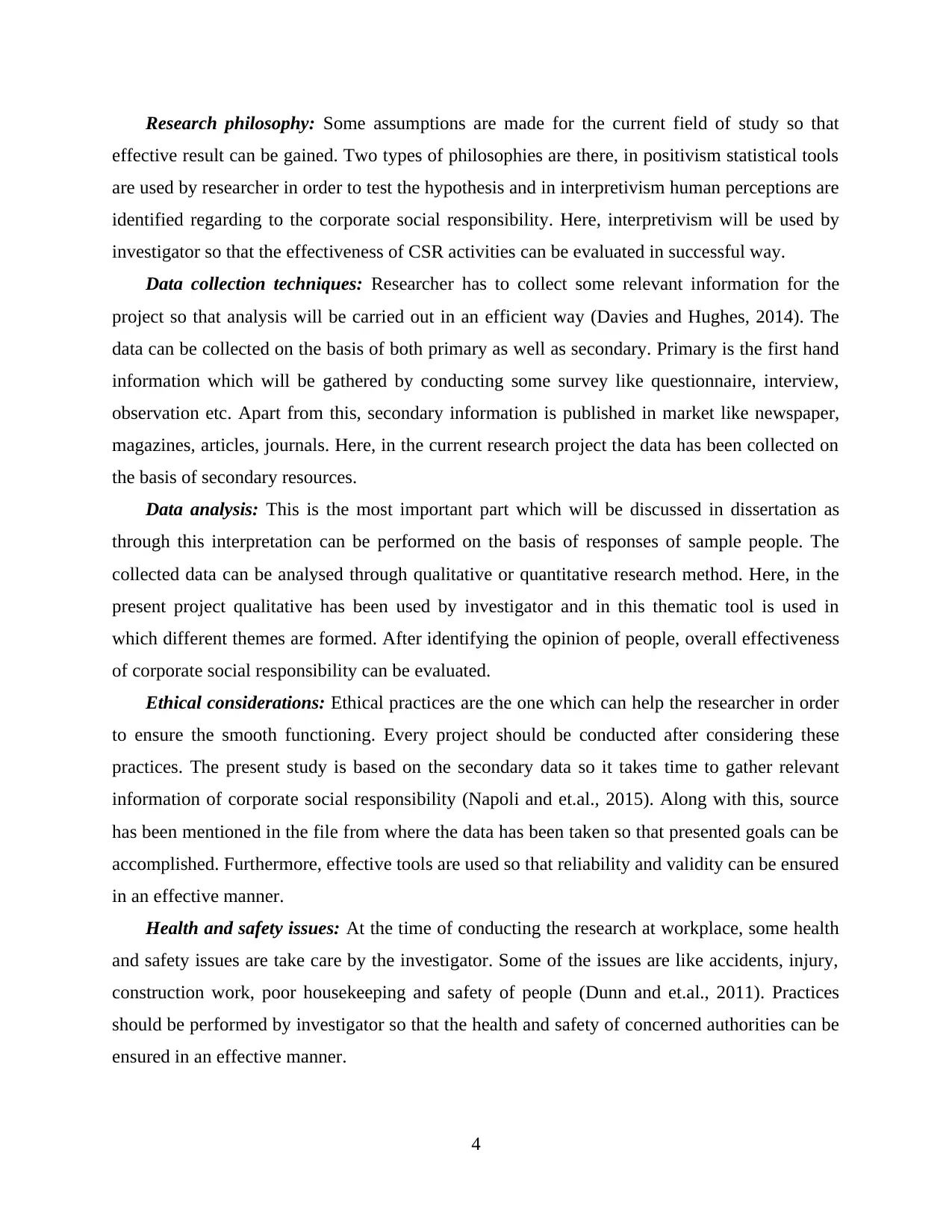
Research philosophy: Some assumptions are made for the current field of study so that
effective result can be gained. Two types of philosophies are there, in positivism statistical tools
are used by researcher in order to test the hypothesis and in interpretivism human perceptions are
identified regarding to the corporate social responsibility. Here, interpretivism will be used by
investigator so that the effectiveness of CSR activities can be evaluated in successful way.
Data collection techniques: Researcher has to collect some relevant information for the
project so that analysis will be carried out in an efficient way (Davies and Hughes, 2014). The
data can be collected on the basis of both primary as well as secondary. Primary is the first hand
information which will be gathered by conducting some survey like questionnaire, interview,
observation etc. Apart from this, secondary information is published in market like newspaper,
magazines, articles, journals. Here, in the current research project the data has been collected on
the basis of secondary resources.
Data analysis: This is the most important part which will be discussed in dissertation as
through this interpretation can be performed on the basis of responses of sample people. The
collected data can be analysed through qualitative or quantitative research method. Here, in the
present project qualitative has been used by investigator and in this thematic tool is used in
which different themes are formed. After identifying the opinion of people, overall effectiveness
of corporate social responsibility can be evaluated.
Ethical considerations: Ethical practices are the one which can help the researcher in order
to ensure the smooth functioning. Every project should be conducted after considering these
practices. The present study is based on the secondary data so it takes time to gather relevant
information of corporate social responsibility (Napoli and et.al., 2015). Along with this, source
has been mentioned in the file from where the data has been taken so that presented goals can be
accomplished. Furthermore, effective tools are used so that reliability and validity can be ensured
in an effective manner.
Health and safety issues: At the time of conducting the research at workplace, some health
and safety issues are take care by the investigator. Some of the issues are like accidents, injury,
construction work, poor housekeeping and safety of people (Dunn and et.al., 2011). Practices
should be performed by investigator so that the health and safety of concerned authorities can be
ensured in an effective manner.
4
effective result can be gained. Two types of philosophies are there, in positivism statistical tools
are used by researcher in order to test the hypothesis and in interpretivism human perceptions are
identified regarding to the corporate social responsibility. Here, interpretivism will be used by
investigator so that the effectiveness of CSR activities can be evaluated in successful way.
Data collection techniques: Researcher has to collect some relevant information for the
project so that analysis will be carried out in an efficient way (Davies and Hughes, 2014). The
data can be collected on the basis of both primary as well as secondary. Primary is the first hand
information which will be gathered by conducting some survey like questionnaire, interview,
observation etc. Apart from this, secondary information is published in market like newspaper,
magazines, articles, journals. Here, in the current research project the data has been collected on
the basis of secondary resources.
Data analysis: This is the most important part which will be discussed in dissertation as
through this interpretation can be performed on the basis of responses of sample people. The
collected data can be analysed through qualitative or quantitative research method. Here, in the
present project qualitative has been used by investigator and in this thematic tool is used in
which different themes are formed. After identifying the opinion of people, overall effectiveness
of corporate social responsibility can be evaluated.
Ethical considerations: Ethical practices are the one which can help the researcher in order
to ensure the smooth functioning. Every project should be conducted after considering these
practices. The present study is based on the secondary data so it takes time to gather relevant
information of corporate social responsibility (Napoli and et.al., 2015). Along with this, source
has been mentioned in the file from where the data has been taken so that presented goals can be
accomplished. Furthermore, effective tools are used so that reliability and validity can be ensured
in an effective manner.
Health and safety issues: At the time of conducting the research at workplace, some health
and safety issues are take care by the investigator. Some of the issues are like accidents, injury,
construction work, poor housekeeping and safety of people (Dunn and et.al., 2011). Practices
should be performed by investigator so that the health and safety of concerned authorities can be
ensured in an effective manner.
4
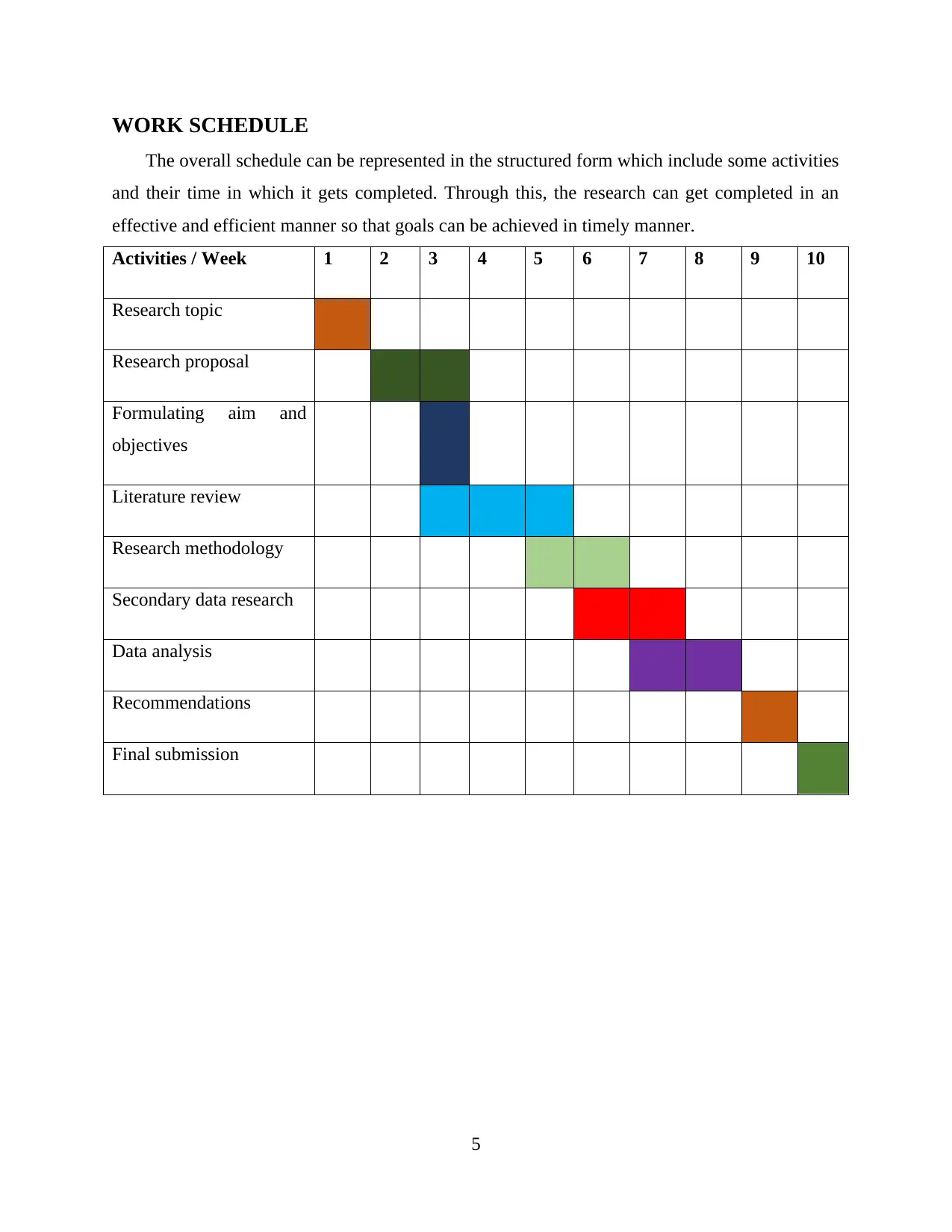
WORK SCHEDULE
The overall schedule can be represented in the structured form which include some activities
and their time in which it gets completed. Through this, the research can get completed in an
effective and efficient manner so that goals can be achieved in timely manner.
Activities / Week 1 2 3 4 5 6 7 8 9 10
Research topic
Research proposal
Formulating aim and
objectives
Literature review
Research methodology
Secondary data research
Data analysis
Recommendations
Final submission
5
The overall schedule can be represented in the structured form which include some activities
and their time in which it gets completed. Through this, the research can get completed in an
effective and efficient manner so that goals can be achieved in timely manner.
Activities / Week 1 2 3 4 5 6 7 8 9 10
Research topic
Research proposal
Formulating aim and
objectives
Literature review
Research methodology
Secondary data research
Data analysis
Recommendations
Final submission
5
Paraphrase This Document
Need a fresh take? Get an instant paraphrase of this document with our AI Paraphraser
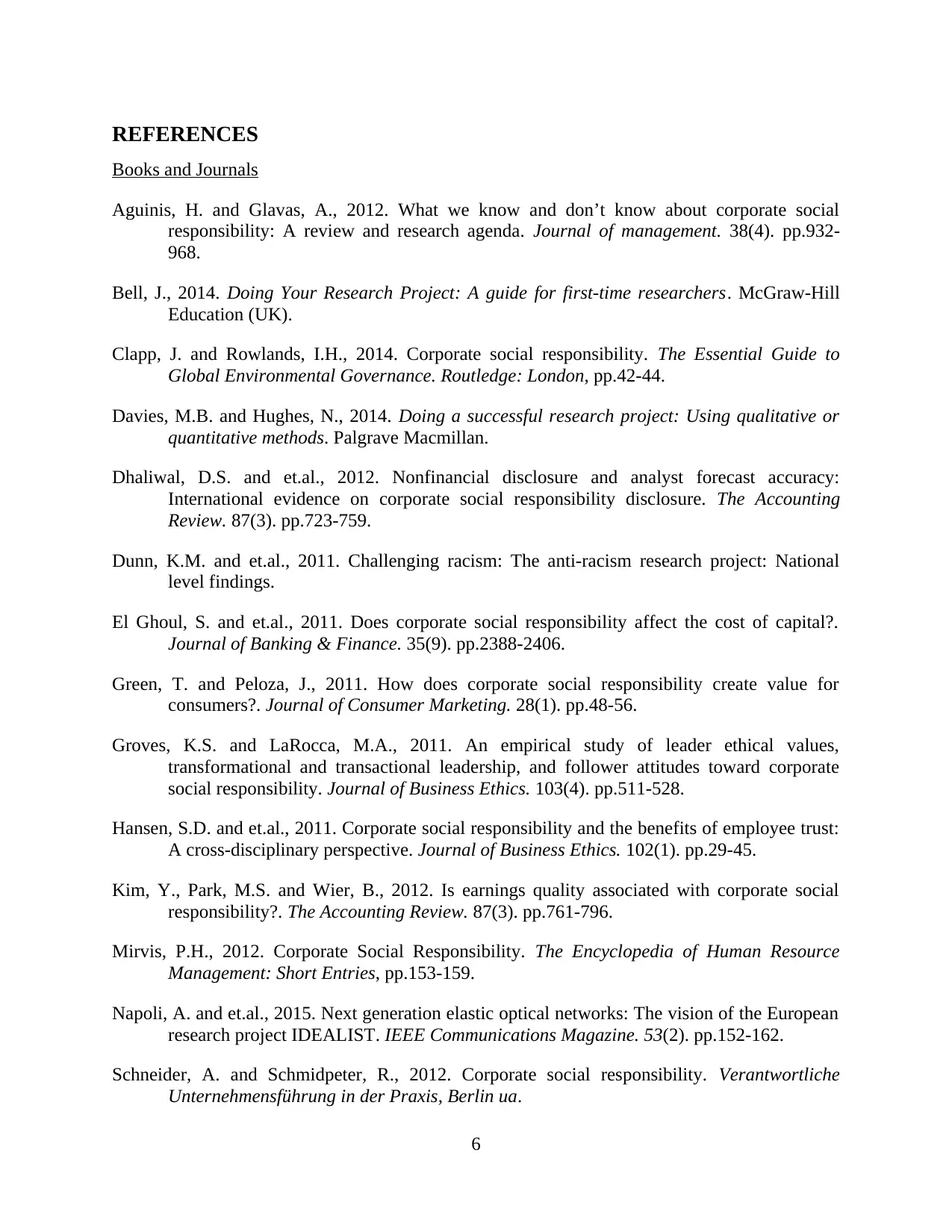
REFERENCES
Books and Journals
Aguinis, H. and Glavas, A., 2012. What we know and don’t know about corporate social
responsibility: A review and research agenda. Journal of management. 38(4). pp.932-
968.
Bell, J., 2014. Doing Your Research Project: A guide for first-time researchers. McGraw-Hill
Education (UK).
Clapp, J. and Rowlands, I.H., 2014. Corporate social responsibility. The Essential Guide to
Global Environmental Governance. Routledge: London, pp.42-44.
Davies, M.B. and Hughes, N., 2014. Doing a successful research project: Using qualitative or
quantitative methods. Palgrave Macmillan.
Dhaliwal, D.S. and et.al., 2012. Nonfinancial disclosure and analyst forecast accuracy:
International evidence on corporate social responsibility disclosure. The Accounting
Review. 87(3). pp.723-759.
Dunn, K.M. and et.al., 2011. Challenging racism: The anti-racism research project: National
level findings.
El Ghoul, S. and et.al., 2011. Does corporate social responsibility affect the cost of capital?.
Journal of Banking & Finance. 35(9). pp.2388-2406.
Green, T. and Peloza, J., 2011. How does corporate social responsibility create value for
consumers?. Journal of Consumer Marketing. 28(1). pp.48-56.
Groves, K.S. and LaRocca, M.A., 2011. An empirical study of leader ethical values,
transformational and transactional leadership, and follower attitudes toward corporate
social responsibility. Journal of Business Ethics. 103(4). pp.511-528.
Hansen, S.D. and et.al., 2011. Corporate social responsibility and the benefits of employee trust:
A cross-disciplinary perspective. Journal of Business Ethics. 102(1). pp.29-45.
Kim, Y., Park, M.S. and Wier, B., 2012. Is earnings quality associated with corporate social
responsibility?. The Accounting Review. 87(3). pp.761-796.
Mirvis, P.H., 2012. Corporate Social Responsibility. The Encyclopedia of Human Resource
Management: Short Entries, pp.153-159.
Napoli, A. and et.al., 2015. Next generation elastic optical networks: The vision of the European
research project IDEALIST. IEEE Communications Magazine. 53(2). pp.152-162.
Schneider, A. and Schmidpeter, R., 2012. Corporate social responsibility. Verantwortliche
Unternehmensführung in der Praxis, Berlin ua.
6
Books and Journals
Aguinis, H. and Glavas, A., 2012. What we know and don’t know about corporate social
responsibility: A review and research agenda. Journal of management. 38(4). pp.932-
968.
Bell, J., 2014. Doing Your Research Project: A guide for first-time researchers. McGraw-Hill
Education (UK).
Clapp, J. and Rowlands, I.H., 2014. Corporate social responsibility. The Essential Guide to
Global Environmental Governance. Routledge: London, pp.42-44.
Davies, M.B. and Hughes, N., 2014. Doing a successful research project: Using qualitative or
quantitative methods. Palgrave Macmillan.
Dhaliwal, D.S. and et.al., 2012. Nonfinancial disclosure and analyst forecast accuracy:
International evidence on corporate social responsibility disclosure. The Accounting
Review. 87(3). pp.723-759.
Dunn, K.M. and et.al., 2011. Challenging racism: The anti-racism research project: National
level findings.
El Ghoul, S. and et.al., 2011. Does corporate social responsibility affect the cost of capital?.
Journal of Banking & Finance. 35(9). pp.2388-2406.
Green, T. and Peloza, J., 2011. How does corporate social responsibility create value for
consumers?. Journal of Consumer Marketing. 28(1). pp.48-56.
Groves, K.S. and LaRocca, M.A., 2011. An empirical study of leader ethical values,
transformational and transactional leadership, and follower attitudes toward corporate
social responsibility. Journal of Business Ethics. 103(4). pp.511-528.
Hansen, S.D. and et.al., 2011. Corporate social responsibility and the benefits of employee trust:
A cross-disciplinary perspective. Journal of Business Ethics. 102(1). pp.29-45.
Kim, Y., Park, M.S. and Wier, B., 2012. Is earnings quality associated with corporate social
responsibility?. The Accounting Review. 87(3). pp.761-796.
Mirvis, P.H., 2012. Corporate Social Responsibility. The Encyclopedia of Human Resource
Management: Short Entries, pp.153-159.
Napoli, A. and et.al., 2015. Next generation elastic optical networks: The vision of the European
research project IDEALIST. IEEE Communications Magazine. 53(2). pp.152-162.
Schneider, A. and Schmidpeter, R., 2012. Corporate social responsibility. Verantwortliche
Unternehmensführung in der Praxis, Berlin ua.
6
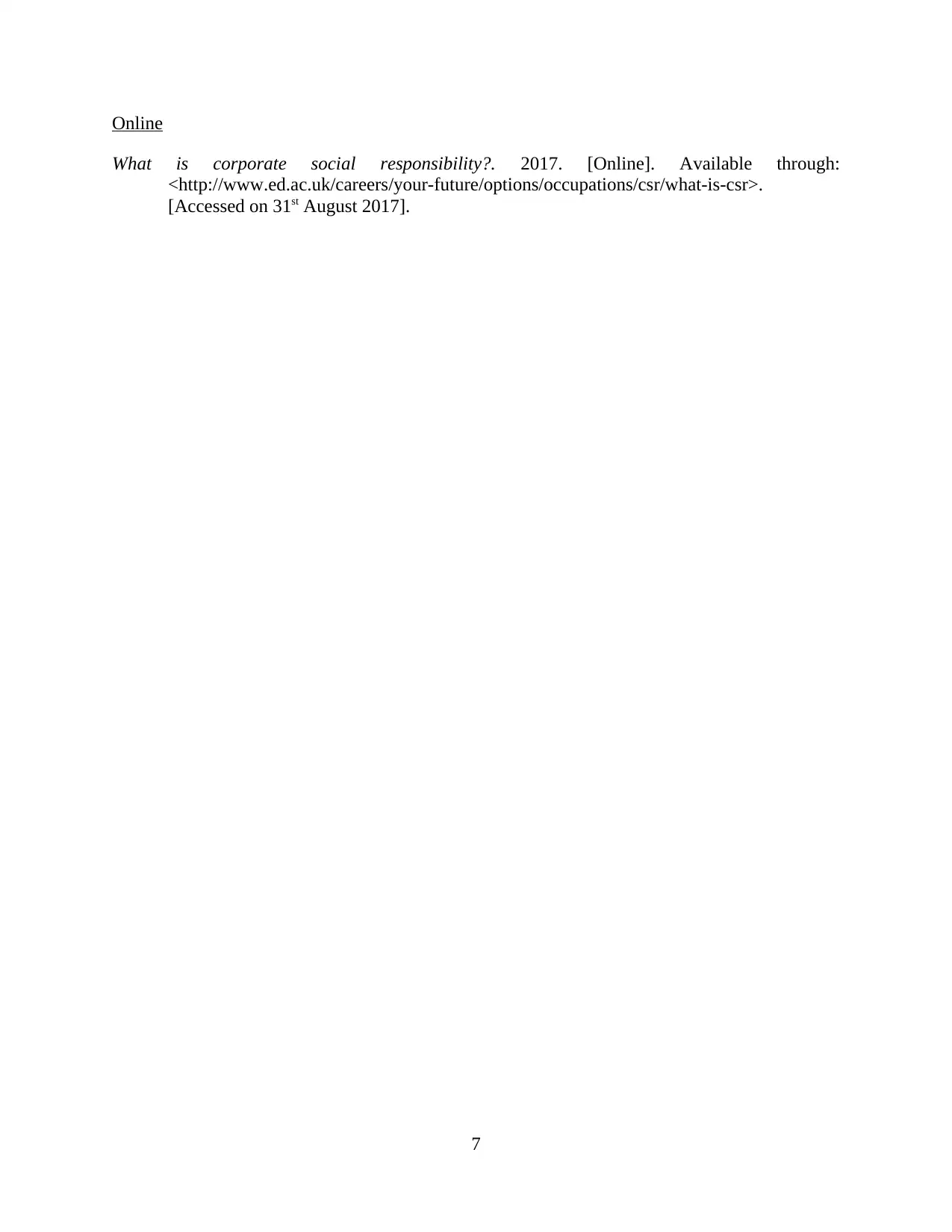
Online
What is corporate social responsibility?. 2017. [Online]. Available through:
<http://www.ed.ac.uk/careers/your-future/options/occupations/csr/what-is-csr>.
[Accessed on 31st August 2017].
7
What is corporate social responsibility?. 2017. [Online]. Available through:
<http://www.ed.ac.uk/careers/your-future/options/occupations/csr/what-is-csr>.
[Accessed on 31st August 2017].
7
1 out of 9
Related Documents
Your All-in-One AI-Powered Toolkit for Academic Success.
+13062052269
info@desklib.com
Available 24*7 on WhatsApp / Email
![[object Object]](/_next/static/media/star-bottom.7253800d.svg)
Unlock your academic potential
© 2024 | Zucol Services PVT LTD | All rights reserved.





